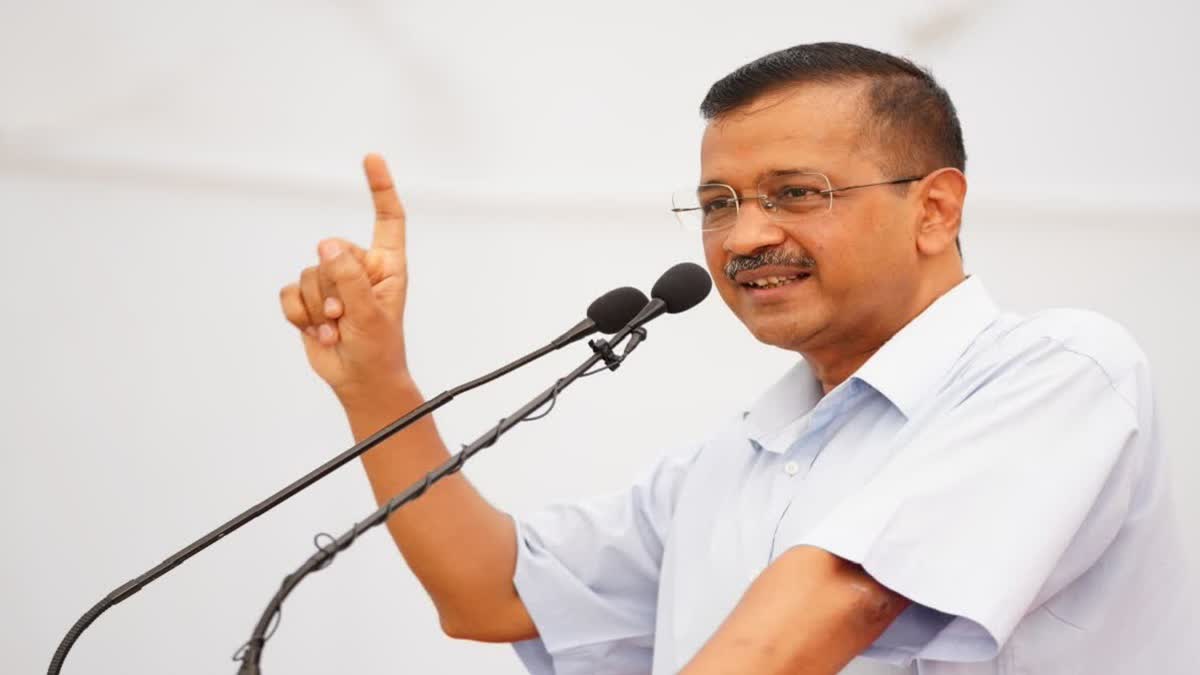New Delhi: The Supreme Court on Friday granted bail to Delhi Chief Minister Arvind Kejriwal in the Delhi excise policy case. The apex court said it would be a "travesty of justice" to keep Kejriwal in custody in the Central Bureau of Investigation (CBI) case pursued after he had already secured bail in the Enforcement Directorate’s (ED) case.
The court said Kejriwal's arrest by CBI was unjustified. It had made some strong observations against the CBI for arresting Kejriwal.
Meanwhile, a Delhi court issued a release order for CM Arvind Kejriwal in the excise case lodged by CBI after his advocates filed bail bond.
Info graphic on the arrest and release of Delhi Chief Minister Arvind Kejriwal (ETV Bharat) The AAP leaders including Manish Sisodia and Atishi who were watching the top court's proceedings were seen cheering each other as the judgement came.
A bench comprising justices Surya Kant and Ujjal Bhuyan had reserved the judgment on petitions by Delhi CM Arvind Kejriwal seeking release from the CBI’s custody in connection with the now-scrapped Delhi excise policy case on September 5. The CBI arrested Kejriwal in June.
Justice Bhuyan said the CBI did not arrest for 22 months but arrested him on the cusp of getting bail in the ED's case. He concurred with Justice Kant on granting regular bail to Kejriwal.
The bench, in its earlier observation, said non-cooperation cannot mean self-incrimination, adding that "therefore, Kejriwal's arrest by the CBI on this ground was impermissible."
The Delhi CM will be released nearly six months after his first arrest by the ED. He got bail in that case two months ago. He could not leave the jail, on July 12, as he was arrested by the CBI.
The CBI’s counsel had vehemently argued that Kejriwal is the kingpin in the alleged scam and there is "a mountain of evidence against Kejriwal". The argument by the CBI counsel relied upon the statement from the approvers, who were listed as accused in the case and were pardoned after they became "witnesses" of the premier investigation agency.
Kejriwal was represented by senior advocate Abhishek Singhvi who criticised that second arrest as an "insurance".
Taking exceptions to this, the CBI counsel argued that a decision in Kejriwal’s favour might set a precedent that could undermine the authority of subordinate courts.
However, unmoved by this contention, the apex court had said that its ruling would be framed in a way that preserves the integrity of all judicial institutions.
The central agencies claimed that Kejriwal played a key role in drafting and clearing the controversial November 2021 liquor excise policy, which was withdrawn eight months later.
Recently, in a spate of judgments, the top court reaffirmed the principle that bail should be the norm, with jail being an exception, even in cases involving stringent laws like the Unlawful Activities (Prevention) Act (UAPA) and the Prevention of Money Laundering Act (PMLA).
The apex court made it clear that restrictions on Kejriwal against entering the CM's office and signing files will continue. Justice Bhuyan expressed reservation against these conditions but he eventually agreed with these restrictions, which were imposed by another bench while granting him bail in the Enforcement Directorate’s case.
What Will Happen Now?
Kejriwal's enlargement on bail would allow him to do election campaigning in Haryana, which is going to polls from October 5. His party has fielded candidates on all 90 seats in Haryana.
Additionally, only 4 months are left for the assembly elections in Delhi, so as soon as CM Kejriwal comes out, there can be rapid decisions on a range of matters, especially the Rs. 1000 monthly assistance scheme for women.
The SC verdict also comes as a setback to the Bharatiya Janata Party (BJP), as it has been demanding that the Delhi government led by AAP be suspended and the President's rule be implemented.
Leaders Who Secured Bail In Liquor Scam
Kejriwal became the fifth prominent opposition leader to be released after arrest in the liquor scam case. Others freed include his former deputy Manish Sisodia, AAP MP Sanjay Singh, Bharat Rashtra Samithi leader K Kavitha, and AAP leader Durgesh Pathak. The Supreme Court, which ordered the release of the first three, said that authorities cannot detain accused individuals indefinitely without trial.
In Sisodia's case last month, the court flagged the violation of his right to liberty.
Read More
- AAP Hopeful Of Kejriwal's Release, Waiting For SC Verdict On Friday: Raghav Chadha
- Excise Policy Corruption Case: SC to Deliver Verdict on Sep 13 on Arvind Kejriwal's Bail Plea
